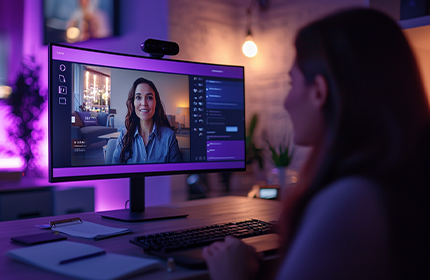















Virtual Administrative Assistants makes your work life easier. They do tasks like:
Answering phone calls
Responding to emails
Daily administrative tasks to keep business running
Managing your calendar and appointments
Typing up data and notes
They take care of these daily tasks so you can focus on the important things.
Lead Generation Virtual Assistants help find new customers for your business. They do this by:
Calling new & old prospects
Sending outreach emails
Texting leads
Booking sales meetings
They are great at connecting with people and setting up opportunities for you to grow your business.
Sales Virtual Assistants help you generate and close sales. They do this by:
They communicate effectively with customers and guide them toward making a purchase.
Social Media Virtual Assistants help your business shine online. They do this by:
They know how to make your brand look great and connect with people on social media.
Marketing Virtual Assistants help maximize your advertising budget and reach. They do this by:
They know how to make every advertising dollar count and bring quality leads to your business.
Graphic Design Virtual Assistants help bring your brand vision to life. They do this by:
They create eye-catching visuals that make your brand stand out and attract customers.
Customer Support Virtual Assistants keep your customers happy. They do this by:
Answering customer questions and solving their problems
Managing support tickets to make sure issues get resolved
Helping with administrative tasks to keep things running smoothly
Scheduling appointments and managing your calendar
Communicating with vendors on your behalf
They excel at caring for your customers and ensuring a good experience.
Need help with a unique role? We’ve got you covered.
Our team has experience hiring for all kinds of positions.
Book a consultation with us and let us know what you’re looking for. We’ll work with you to find the perfect fit for your business, no matter how specific or specialized the role may be.


We understand how important it is to speak fluent English with little to no accent. We go through hundreds of applicants a day and only bring you the top 1%.
Save thousands of Dollars a year by hiring the Virtual Assistant directly. We charge a one time flat hiring fee if you decide to hire one of the Virtual Assistants we bring you, and help you onboard them directly to avoid ongoing fees.
Get 50% off placement fees for every additional VA you hire within 12 months of your first placement.
You’re not locked into any sort of long term commitment with us or any Virtual Assistant you hire through us. If you’re not happy with the applicants we bring you, we don’t get paid.
Hire top-tier virtual assistants in just 72 hours. We handle the screening, so you only meet the top 1% of candidates — ensuring you find the perfect fit for your business quickly and efficiently.

Tell us what role you want to fill, job requirements, who your ideal fit would be, experience required, and anything else that’s important in who you hire.

We will interview qualified Virtual Assistants and assess their skill level, then pass on 4-6 Virtual Assistants for you to interview that match your requirements.

After you interview the Virtual Assistants we bring, you get to choose who you feel is the best fit to work in your business.

6-Month free replacement guarantee on any Virtual Assistant you hire through us to ensure you have a perfect fit. You’ll also have a dedicated manager to help you set up training, performance tracking, and any other support you need.

We focus on four key regions:
Our Latin American Virtual Assistants are especially popular with US businesses, thanks to their:
We’ll guide you on which region best suits your specific needs, but the final choice is always yours.
Our partner company takes care of all payroll and compliance requirements for your Virtual Assistant.
This means you can focus on growing your business while they handle:
It’s a simple, worry-free solution that ensures everything is managed properly and legally.
It’s simple – we charge a one-time flat fee, but only after you’ve found your perfect match.
Whatever hourly pay you decide to pay goes directly to the Virtual Assistant you hire.
Staffing agencies charge monthly fees but only pay a small portion to Virtual Assistants. This often results in lower quality talent, as skilled VAs avoid arrangements where agencies keep a large chunk of their earnings.
At Remote Leverage, we charge just one flat fee after you hire. Your Virtual Assistant receives 100% of what you pay them directly. This attracts higher-quality talent and eliminates ongoing middleman costs, saving you money while getting better results.
After hiring your Virtual Assistant, you’ll have access to a dedicated Customer Success Manager who will help ensure your success.
They’re here to assist with:
Virtual Assistant’s hourly rates depend on the skills and experience they have, and also the region you’re hiring from.
The hourly rate you agree to pay goes directly to your Virtual Assistant – we don’t take any fees from their pay.
The Virtual Assistant works directly for you while we make it simple and compliant. Here’s how:
It’s the best of both worlds – direct hires with none of the complex paperwork or compliance concerns.
While it’s rare to have issues since candidates are thoroughly vetted by both our team and you, we understand the importance of finding the right fit. That’s why we offer:
This double-screening process (by us and you) helps ensure quality matches prior to hiring an applicant, and our guarantee gives you extra peace of mind that you’ll find the right Virtual Assistant for your business.
We maintain extremely high standards for English fluency. Here’s how we ensure this:
This strict vetting process for language skills means you’ll work with a Virtual Assistant who communicates clearly and professionally from day one.
Your Virtual Assistant will work according to your schedule and time zone.
They’re accustomed to US hours, and you get to set the working hours that best fit your needs.
Yes, you can start with either part-time or full-time.
The minimum is 20 hours per week, as our most qualified Virtual Assistants prefer stable positions with consistent hours.
During this meeting we will go over the role you’re planning to hire for, what the process looks like, answer any questions you have, and proceed to next steps.
This consultation will be done over zoom so it is best if you could be on a computer!

Fill out this form to book a 15 Minute Virtual Assistant Hiring Consultation
"*" indicates required fields